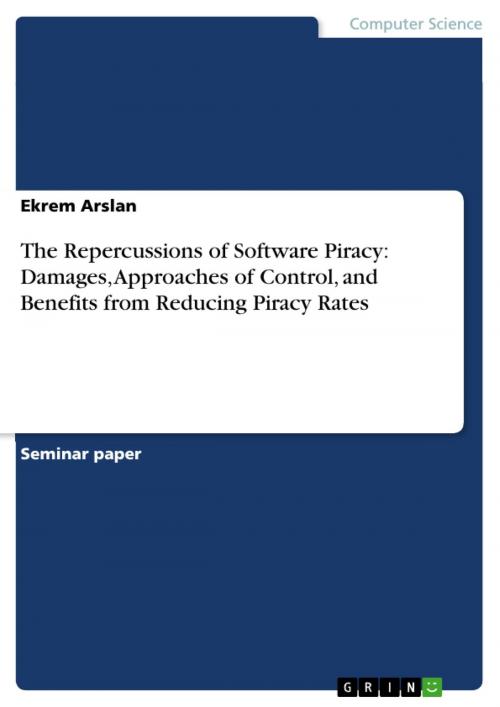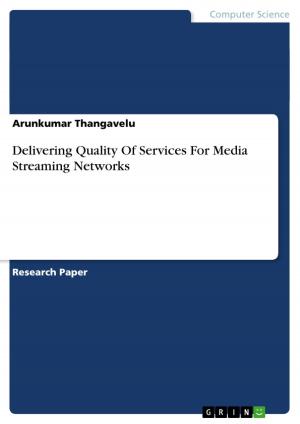The Repercussions of Software Piracy: Damages, Approaches of Control, and Benefits from Reducing Piracy Rates
Nonfiction, Computers, Advanced Computing, Computer Science| Author: | Ekrem Arslan | ISBN: | 9783638492249 |
| Publisher: | GRIN Publishing | Publication: | April 18, 2006 |
| Imprint: | GRIN Publishing | Language: | English |
| Author: | Ekrem Arslan |
| ISBN: | 9783638492249 |
| Publisher: | GRIN Publishing |
| Publication: | April 18, 2006 |
| Imprint: | GRIN Publishing |
| Language: | English |
Seminar paper from the year 2006 in the subject Computer Science - Commercial Information Technology, grade: 1.3, University of Sunderland (Master of Computing- E-Technology for Business), course: Mastermodul: Research, Ethical, Professional and Lega Issues, 27 entries in the bibliography, language: English, abstract: Copyright infringement of software vastly known as software piracy has become an economical menace. Particularly, the East Asian parts are the basic distributors of unlicensed software and denote the highest piracy rates world wide. The counterfeits have become high quality products that they can even compete with original software. Reasons, why software piracy exists and who the pirates are, are appraised in this report. The tremendous damages of high piracy rates on, for example, governmental loss of tax revenues, loss of jobs, are shown. Attention is paid, whether the Directive on the enforcement of Intellectual Property Rights (Directive 2004/48/EC) passed from the European Union, which has ingredients of different international treaties such as the WIPO, the TRIPS and the WTO, is able to stem software piracy. This leads to show why only the implementation of laws causes no objective effect on the surge of software piracy. The influences of attributes such as attitude, income, and education, which play a significant role to curb piracy rates across the globe, are scrutinised. Furthermore, benefits from a reduction of piracy rates are evaluated as well.
Seminar paper from the year 2006 in the subject Computer Science - Commercial Information Technology, grade: 1.3, University of Sunderland (Master of Computing- E-Technology for Business), course: Mastermodul: Research, Ethical, Professional and Lega Issues, 27 entries in the bibliography, language: English, abstract: Copyright infringement of software vastly known as software piracy has become an economical menace. Particularly, the East Asian parts are the basic distributors of unlicensed software and denote the highest piracy rates world wide. The counterfeits have become high quality products that they can even compete with original software. Reasons, why software piracy exists and who the pirates are, are appraised in this report. The tremendous damages of high piracy rates on, for example, governmental loss of tax revenues, loss of jobs, are shown. Attention is paid, whether the Directive on the enforcement of Intellectual Property Rights (Directive 2004/48/EC) passed from the European Union, which has ingredients of different international treaties such as the WIPO, the TRIPS and the WTO, is able to stem software piracy. This leads to show why only the implementation of laws causes no objective effect on the surge of software piracy. The influences of attributes such as attitude, income, and education, which play a significant role to curb piracy rates across the globe, are scrutinised. Furthermore, benefits from a reduction of piracy rates are evaluated as well.















